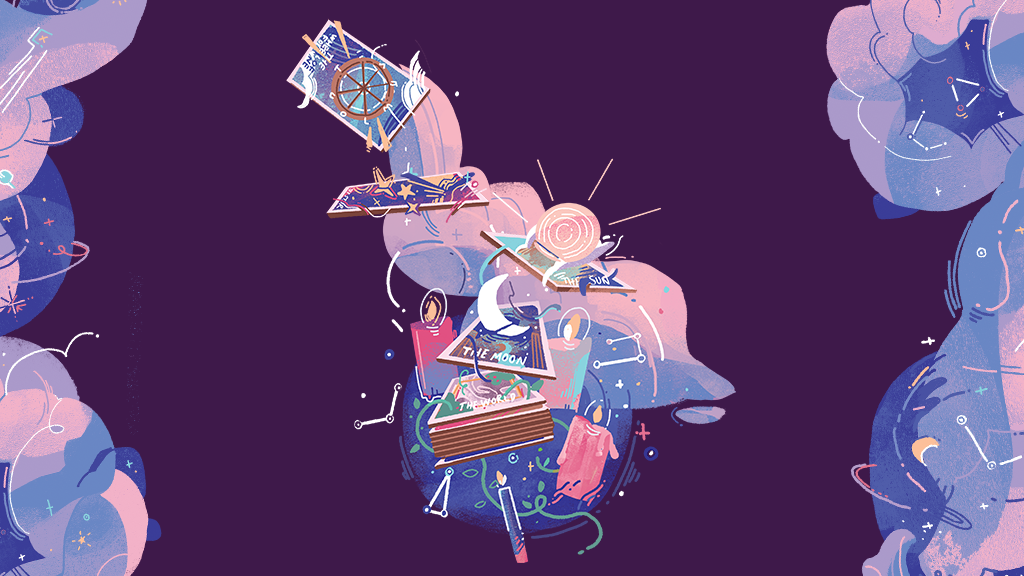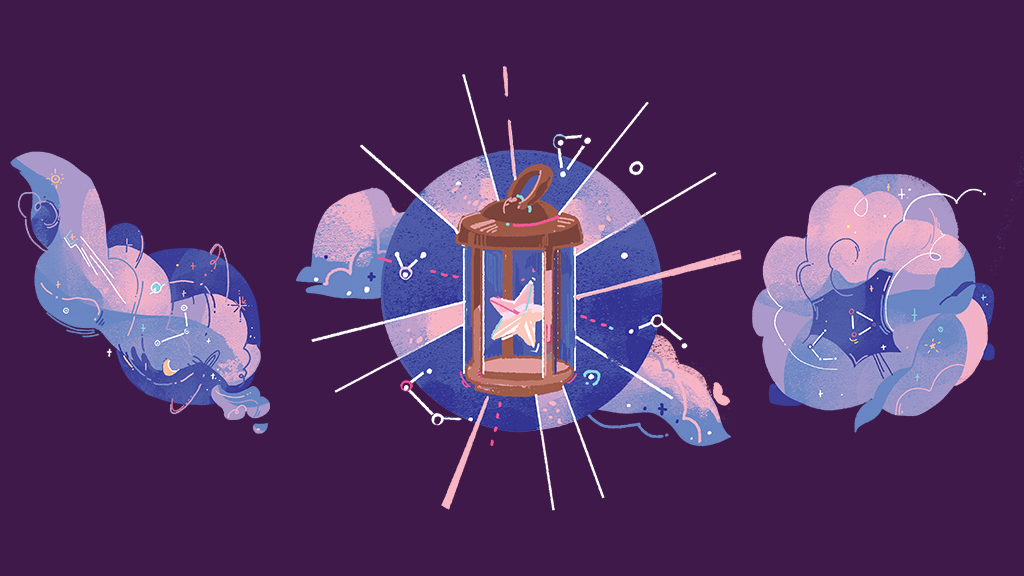The Comfort of Divination
by Karina Le | published Oct. 8th, 2019
Divination, regardless of whether you believe in it or not, comes in many different forms. Currently, there is a rising trend of various forms of divination — such as astrology and tarot reading — that people have been turning to for comfort.
“Astrology offers those in crisis the comfort of imagining a better future,” wrote Julie Beck, writer of “The New Age of Astrology," while describing this rising trend.
It is undeniable that the more uncertain our environment is, whether it be politically or economically, people are finding comfort in having a sliver of knowledge of what could be.
Astrology
Arguably, one of the most popular forms of divination in the modern age is astrology. It’s also generally one of the first forms of divination people encounter nowadays.
Astrology is basically the correlation between the position of planets and stars, and how it relates to an individual in terms of what time they were born and where. In short, astrology is a way for us — human beings uncertain about the world around us — to find meaning in our relationship to the universe. It’s a way to find comfort that there is meaning to one’s existence and meaning in how people connect with others. Generally, you can see its usage in horoscopes online or even in the newspaper.
Donna Casey, a second year Electrical Engineering major, advocated for the usefulness of astrology in terms of the comfort it brought to her.
“I fit Aquarius very perfectly, and so that kind of gave me the idea that there’s something to [astrology]. If it can describe me so well, it’s more likely than not to be more than chance,” she said.
Granted, there are and always will be more people skeptical of astrology than believing in it, as it's not technically a science. In fact, there’s really not a lot of scientific basis on astrology. Rather, the information that astrology builds itself on in organizing people in its various groups is on the basis of the common correlations of people born in the same month.
Shaina Thayer, a third year Physics major, is one of these skeptics. She provided an explanation to her reasoning, however.
“I don’t have anything against astrology,” she first explained, “ ... [but] there’s just too much to it.”
Thayer further explained that to understand astrology, there’s a lot to read up on. Generally, most people know their astrological sign through their date of birth. However, that is only a small percentage of how deep astrology goes into nowadays. Astrology can go further into explaining the meaning of someone’s personality and how they connect with others by also having a person’s time of birth and the location of their birth.
For example, the astrological sign that people categorize themselves as by using their date of birth is their "sun" sign. By having the time and location, one can find their “moon” and “Mars" sign, respectively, as one can be able to find the placement of the moon and the planet Mars given this information. There are more signs to be found in one’s natal chart (a map of all the planets’ locations when you were born) that gives a more defined examination of one’s character. But the most important signs are the sun, moon, and Mars (also known as rising) signs because those are the signs that center around the individual.
The sun sign centers on how an individual tries to project themselves onto the world, the moon sign describes a person’s inner self and how they see themselves and the Mars sign signifies how people around an individual see their projection.
So, there's more to astrology than what meets the eye. Of course, it could all very much be correlation without causation; but the fact remains that astrology brings about a comfort that makes people feel secure in themselves and gives a possible glimpse into the very scary, very unknown future.
There are a variety of reasons why people may go deeper into the subject, but Casey described it simply as a need to connect with others.
“Some of [astrology] you have to take with a grain of salt,” Casey said. “But to be able to read in a book and be like, ‘Hey, this is normal’ ... it just gave me hope that I’d find other people someday.”
“It just gave me hope that I’d find other people someday.”
Tarot
Tarot is one of the more niche forms of divination that has been quickly gaining popularity alongside astrology. However, tarot has been around for a long time — going as far back as the 15th century, according to tarotologist Keith Jones.
“These cards were [initially] used to educate children in moral instruction,” Jones said. “Now, with just a little nudge, that turns into telling the future.”
Jones noted that although it’s difficult to pinpoint the exact time and reason that the use of these cards shifted to foreseeing the future, tarot has inarguably become a staple of the realm of divination ever since.
Tarot can be used in a variety of ways, such as telling one’s fortune. But even telling someone’s fortune may differ depending on who’s reading the tarot, to the decks they use, to how the person reading tarot prefers to conduct the reading.
Rauncie Ryan, chaplain to RIT Pagans, explained her process on reading tarot as a way for people to open up, so to speak.
“When I am doing a card reading for someone, I feel a real connection with someone,” Ryan explained. “I think of tarot reading as a way for people to open up about what they’re going through.”
For some, tarot is a way for people to take a glimpse at their future, and have comfort in knowing that their current situation is only temporary.
However, there are a lot of misconceptions about what tarot reading entails — especially by how mainstream media portrays it. Sometimes, tarot readers are represented as mystics who have a great show of pizzazz to their readings; sometimes, they are portrayed as scammers who have darker intentions. Jones, who has been researching the origin of tarot for a long time, brought some light to what tarot reading really entails.
“In all my years of studying tarot, I have yet to meet a fraud,” Jones said.
Depending on the format of the reading, it could focus on a certain aspect of one’s life, such as love or one’s financial future. However, for Ryan’s readings, she prefers to use the "Celtic Cross" format, where she places cards in a cross and four other cards to the side. The cross usually lays the foundation of the client, and their present or past difficulties that have occurred in their life. Then, the rest of the cards are meant to be used as a possible way they may deal with the situation. Depending on the reading, the tarot reader may encourage their client to either explain their situation as to receive counsel on it or forewarn of obstacles in their path.
Nonetheless, tarot can bring a sense of comfort and certainty to a concept as abstract as the future.
Of course, there are as many skeptics as believers when it comes to tarot, if not more. Some people may even be afraid of tarot because they believe that if they learn about their future, their fortune will be their only path in life. Ryan asserted that this wasn’t the case.
“When I do this reading for you, this is shadow of what could happen," said Ryan. "But what I want to say to you is that anything I say to you today is something that you can change.”
“Anything I say to you today is something that you can change.”
Life isn't always constant. People aren’t the same as they were months ago, and months from now, they won't be the same person anymore. People are always changing, and— for people who use divination in general — they are searching for ways to change.
Comfort and Discomfort
Of course, there will always be skeptics everywhere, especially when it comes to non-scientific subjects such as divination. Even those who believe in certain forms of divination will point out its rather paradoxical nature. However, despite the vagueness of divination overall, to completely make yourself ignorant of anything will only lead to further misunderstandings.
Ryan made a connection between the discomfort of divination and the discomfort of people in terms of paganism. She described how people grow to fear paganism and anyone who practices it because all they know of paganism is its negative connotation. However, paganism is more about community and cultivation of self-love and self-care, just as most other religions are.
“Things remain in the dark if we don’t put [them] to light,” Ryan said.
Divination, despite its lack of scientific foundation, is something that can bring immense comfort to people who may have anxiety about what the future may hold, and there really is no harm in that.
“It’s like you can contact someone who’s looking out for you,” Trayer said, regarding the comfort of divination, whether it be tarot, astrology or otherwise.
Life can get difficult, and to have a sense of confidence that everything that will come out alright is something that attracts many people toward divination in the first place.
“It’s like you can contact someone who’s looking out for you.”
Regardless of whether or not you are a believer in divination, there's certainly something to be found after connecting with someone, no matter their way of life. Divination, in a sense, is all about connecting with yourself, and thereby helping you connect with others. This may come by having similar astrological signs, or by having your tarot read and having an honest conversation about yourself and your struggles with another real human being.
Although magic — in the way it’s portrayed in movies — may not be real in our world, the real magic in divination is about the experience of expanding one’s horizons and thinking more deeply in the introspection of self, and the way we handle our lives.




